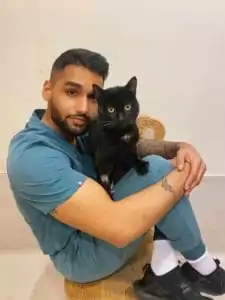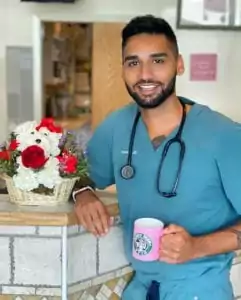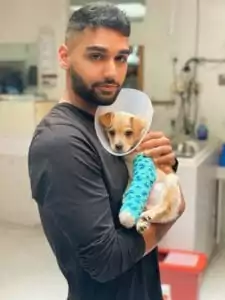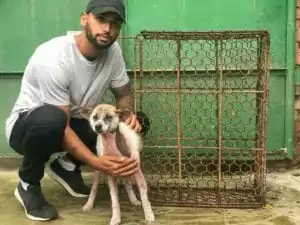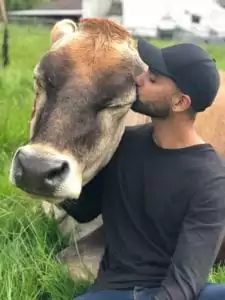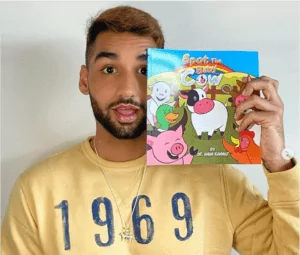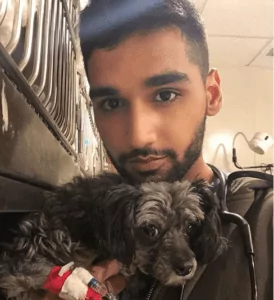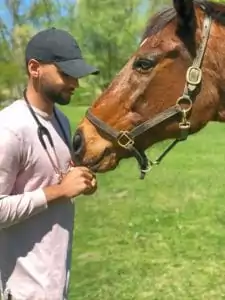Hello Aman, please introduce yourself to our readers
Hi! My name is Aman Kanwar and I was born in Vancouver, Canada (I always want to give a shout out to my Canadian peers). I moved to Queens, New York, where I practice as a small animal Emergency Veterinarian.
Why did you decide to become a vet?
Well, actually, veterinary medicine was like a professional steppingstone for me. Growing up as a kid with my grandfather I would always rescue pigeons off the streets. Pigeons that were sick or injured, you know… We would take the pigeons and we would keep them at our place and give them food and water. Then once they were okay, we would go and drop them off at the veterinary clinic or the wildlife veterinary clinic. And I remember every time we would drop them off, I would just be at the reception area wondering what happens when they cross that barrier into the treatment room.
I always wished that I could do more to help the animals that I took off the streets. But, of course, I didn’t know anything about medicine. I think as I grew older and I went into university and developed the love for science and of course my compassion for animals was always there. I was like, this is just something I want to pursue. I want to rescue animals, and I want to be able to treat them and help them heal too. So, I think that’s what made me go into it.
In terms of why animals and not people, I always just felt like I gravitate more towards people and animals who have less of a voice. And I think that’s because growing up as a person of color, and growing up as somebody in the LGBTQ community, I always felt like somebody that did not have a voice, it was pretty hard for me to relate to people. I was always afraid of being bullied. So naturally, I always drew towards animals, because I always felt like animals didn’t have a voice and were often misunderstood so I always felt a special connection with them.
And I think that’s why animals. But, I just love medicine in general.
Where did you study? How did you like your vet school?
So, growing up in Canada, you only have three vet schools, it is not like in the USA where there are 30+ vet schools. In Canada, you have three and they are split into three regions. So if you are in the west coast, you can only apply to the vet school on the west coast; if you are in the middle you can apply to the middle one and if you are in the east coast, you can apply to the east one.
So naturally, competition is really high. I actually ended up going to the Ross University of Veterinary Medicine. That is on St. Kitts West and Nevis. It is an American accredited school. And then for your clinical year, you choose a clinical practice in an American or European institution to finish off. I chose the Tufts University of Veterinary Medicine in Boston and I loved it! I think Ross University was my best two and a half years ever! Just living in St. Kitts on the Caribbean Island and practicing and studying veterinary medicine and just being so isolated from the rest of the world and focusing on what your passion is and what you want to do with your career.
I think the amount and types of people I met during those two and a half years was my favorite part. I feel so grateful to be a part of that community. I was on this island with people from literally all over Canada, the USA, some of them even international. All these ways of life, the ways of thinking and perspectives, were fused together because of a mutual love for veterinary medicine. You learn to approach situations with different perspectives and techniques. You learn people’s way of approaching a case due to where they are from, what medications they use, the things they have seen in their homeland.
I loved my vet school! They were really hands-on and I would recommend Ross University to anyone!
What about your life as a veterinarian in New York?
So I am an emergency veterinarian. I don’t work at a big fancy specialty hospital or a referral clinic. I work in a sole emergency center. I wanted to do that because as a new graduate I wanted to work up my cases and see them through all the way, with exceptions of course. To me it is important when I speak with a client, to develop that relationship and it is always nice to communicate with them while their pet is in the hospital and then see their pet get better; to do the procedures their pet needs and to transfer them to the regular veterinarian, to the appropriate clinic, or just send them home if they’re better. I love big specialty/ referral hospitals, but as an emergency veterinarian at one of those practices, I think you mostly just stabilize the pet and then transfer right away to the most appropriate service. I wanted to be more hands-on.
Working at a smaller clinic, we are also lower cost, even though people may not think so. Lower cost means I get to see a larger diversity of cases. We are individually owned, we are not corporate, which means that if a client really needs help with finances we are able to make those adjustments for them if needed. And that really makes me happy, it helps me sleep at night. It’s like “hey this dog needed a $4000 surgery. The owner couldn’t afford it, but we were able to help them out with something. So the pet didn’t just get sent away.”
For me, all those aspects kind of helped me choose my first position as an ER vet. Yeah, the hours are long… Right now I work between 70 to 80 hours a week because of COVID. I’ve been working a lot more because of staff shortages and regular veterinarians being closed. We are also kind of not only seeing emergency cases but also things that regular veterinarians would see because of the pandemic.
I like being an emergency veterinarian. I like the fast-paced environment and the adrenaline rush. I like that when a patient comes in very critical, I am able to help them and make them and the owners feel better. There is nothing like having a pet come in on the verge of not making it, but then having to stabilize them and say hey, this pet might pull through after all.
How did the Traveling Vet Rescue project start? What do you do and what are your next goals or destinations?
The Traveling Vet Rescue is my “baby”. 😊 It uses the three things I am most passionate about in life as a whole. That is one: Veterinary Medicine, two: traveling, and three: educating people. I always wanted to be a spokesperson for something I was passionate about. So, that is kind of how the Traveling Vet Rescue was born.
I was invited to speak in London at the Cat Festival, about 3 years ago now. I thought it was the perfect platform to launch my rescue, so it was launched in London. It was a long time in the making and I finished it right as I was finishing vet school, and right as I was getting offered to fly to China to help out with dogs that were stuck in the meat trade. So essentially, that was the Traveling Vet Rescue’s first project, going to slaughterhouses in China and rescuing dogs from slaughterhouse situations, putting them into a local shelter in China, and then flying the dogs back to the USA for them to be adopted out.
I was in China for about 2 weeks, and it was such a life-changing experience. I made an amazing friend. Experiencing the culture, understanding their perspective on animal welfare, and speaking to the locals, educating them about how animal welfare in the US works were some highlights. But also just general husbandry, how they approach spays and neuters… It was all such a learning experience! At the end of the day, I brought back 6 dogs that found homes in the US. It was very worth it!
So, that was the first project for the Traveling Vet Rescue. I also partnered with The Big Cat Sanctuary in London for a week. Working with them and seeing how they run that sanctuary, was so incredible. They have such a fantastic team there.
So that’s what I like most about the Traveling Vet rescue. Not only that I get to go and help animals in all these different places, but I get to partner up with local organizations wherever I go. It becomes a sort of collaboration. It is not like “hey, I’m coming in and doing this.” It’s more so ‘I’m working with you to help you be able to do what you are doing a little bit better”.
And then, after that, I was supposed to go to India this year, but COVID happened. However, in 2021 I am taking a month off work and traveling to 4 destinations for a week each. Just to travel from one place to another, and do rescue work. My goal is never to say “yeah, I come in and do all these spays and neuters and I give you all this medicine and I leave”, I want to target all the different aspects of animal welfare.
I want to help the animals, the people associated, but also I want to go to a local school and speak to the children about animal husbandry and how to take care of an animal. Because they are the next generation and that’s important. I want to go to the local farmers and talk to them about the zoonotic diseases that you can possibly get from animals and how to prevent them, how to protect yourself. That’s kind of Traveling Vet Rescue in a nutshell.
You have a children’s book! Can you tell us more about that and how did that come to be?
Haha, first a disclaimer: I am a passionate vegan, not a preachy vegan. As I was saying earlier, it is very important to me to educate the next generation, so that they can make the most ethical decisions for themselves. I don’t want to tell them what to do, I want to give them information and kind of I just want them to form their own opinion and choose their own lifestyle.
When I was in school at Ross University, I was a part of this program called “READ” and it was something I looked forward to every weekend. We would go read a book about this dog that goes into the vet hospital for its first exam (and the book came with a little plush toy of the dog). We would read that story to the kids at the hospital because it would help them relate to the animal and that animal’s experience since the kids were going through something similar. Like “Hey, this is Josh (the dog’s name was Josh), he is going to the hospital and it was scary, he was scared. But in the end, he makes it through and he’s feeling better.”
That kind of gives them hope and helps them relate to dogs. I thought that was such a powerful thing and when I was thinking of how I can help the next generation relate to animals on a deeper level, I started doing these classrooms/community center talks with my other vet friends. We would go with a puppy and talk to kids in different communities about dogs. We’d say: “this is a dog, this is how you take care of a dog, dogs have feelings and they deserve care…”. It was so inspiring to see how kids interact with animals because they are so innocent and to them, it is like “yeah, of course, dogs have emotions, of course, they have feelings”.
When I was growing up, I was obsessed with Clifford the Big Red Dog and Spot the dog and all these shows about dogs and cats. I think that really helped me relate to animals growing up. I was like, ‘why was there never a show or a book about farm animals, like about cows or a pig?.” The only ever farm animal stories were about a pig getting eaten… You know it wasn’t anything that would’ve helped me relate to a farm animal. And I feel that if there was, I may have formed that bond at a younger age, I would have chosen this lifestyle a lot earlier than when I did.
So to help influence the next generation, I kind of wanted to make a play on the book Spot the Dog (something I was reading as I was growing up), so I made “Spot the baby cow.”
Spot the baby cow is just a cow that wakes up one day and realizes that his mom is no longer there, which is something that does happen in the dairy industry all the time because they do get separated very early on. And then he goes on this adventure looking for his mom. On his adventure, he meets a mommy dog with her puppies and a mommy cat with her kittens and even a mommy human with her children. They have these conversations and realize how similar they are despite their external differences.
My hope is that a kid reading this book would be like “yeah, the puppies want their mom, and the human kids want their mom, so of course, Spot wants his mom too”. Kids can relate to missing their mom because every child wants to be with their mom all the time. It is a happy book, it doesn’t have a sad ending or anything. But it’s just to open a dialogue between parents and kids. It’s more so relaxed storytelling that delivers a powerful message. It’s kind of what I wanted to achieve because I feel like it’s a book I would want my kid to read.
How often do you encounter veterinary professionals being bullied by clients and how would you handle such a situation?
All the time – is the short answer. This happens all the time. It may happen to the extent where we have an incident every week. Most incidents are very swiftly resolved. In terms of handling such a situation, we all just try to be understanding and professional which fixes most misunderstandings. However, sometimes it is taken advantage of.
Every time I get a client and my technician says: “hey, they are a little upset and agitated” or “they are a little angry” due to the wait or something, I just go in and be extra pleasant and understanding. Honestly, 99% of the time, this kind of resolves it. I think people are inherently good. I think everybody is looking to see that you care, that we are in this profession to care and you are a doctor that cares. Once you show them that you care, they kind of ease up and things are okay.
I’ve had colleagues that have had really bad situations. I personally have not had a crazy situation, except this last one. But in the veterinary community, this happens all the time. There is a reason that there are specific courses designed in vet school to help navigate these situations. At the end of the day, we’re also human beings with feelings.
Respect is always a two-way street and as understanding, as we try to be, we’re dealing with our own daily stress, especially in an ER facility. So if I can step out of my stressful bubble to be there for you, I hope they can do that for me too, and most of them do. Some people think of medical professionals to be robots (fast, cheap, obedient), and as cool as that would be (haha), I don’t think you want a robot treating you or your loved one. Robots don’t care, we care.
How is the situation with veterinary professionals that are part of the LGBTQ community and how is the LGBTQ community treated within the veterinary community and by clients?
I honestly don’t think I can speak for everyone when answering this question, as we all have different experiences. I don’t want to upset people in the LGBTQ community. I have never personally been discriminated against (that I know of), but members of the LGBTQ community are discriminated against every day and in every type of situation you can imagine. So I don’t think this (veterinary medicine) is something that is an exception.
I am sure that they are being discriminated against in our field as well – just as females are, just as people of color are -all minority groups are being discriminated against in every field you can imagine. I don’t think enough is being done to change that at the moment. It is something that I am very passionate about and I hope I can help make a difference. My goal would be to join some of these institutions that govern veterinary medicine and help reform policies. Or even just speaking out about it with the platform I have.
I’m male and I recognize that’s an absolute privilege – but I’m also an openly gay man, I’m a person of color, I have tattoos, I’m a part of multiple minority groups and even though none of these things have an impact on my medical skills, they do have an impact on my career opportunities. And that’s where the discrimination lies.
Just because I am an openly gay Indian man, it doesn’t mean that I am less qualified than to treat your pet in comparison to an older straight white man, you know? I think this next generation of veterinarians is really what’s going to change the industry. Because we are standing up for things now, more than ever. Now, we are calling everyone out for their discriminatory behavior, we are saying this is not okay and we are not going to stand for it. I think in the next 5-10 years, we are going to see a big shift in how workplace etiquette is managed and handled.
Do you have any advice for future veterinary professionals?
I would just say: BE THE CHANGE. I think that we are at that pivoting point where they will really drive this field to the type of field we want it to be. I feel like we will continue to fight for our mental health, compassion fatigue, work-life balance, discrimination among different minority groups, gender equality, cyberbullying (wink). It’s so inspiring to see women in the veterinary field standing up and saying “hey, I deserve to be treated and paid equally to my male counterparts”. I hope we can continue to see these changes actually be implemented.
I feel like we are at a point where we are taking all these steps and I think that the next generation of veterinarians is what’s really going to solidify our stance. We’re not afraid to say “that may have been okay in the past, but now this is the kind of community that we want to be: we want to be compassionate, we want to be equal, we want to be taken seriously, we want to be treated as humans.” All we want to do is help your animals, but that doesn’t mean being born with this passion means I have to put up with all this secondary BS that comes with it. That’s not okay.

